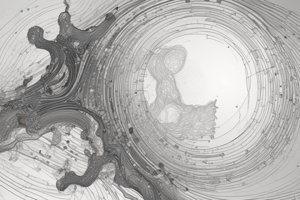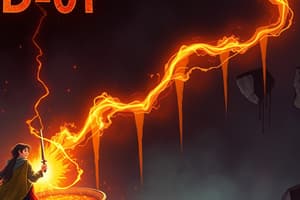Podcast
Questions and Answers
What does Article 9 of the Japanese Constitution primarily address?
What does Article 9 of the Japanese Constitution primarily address?
- Healthcare regulations
- Educational reform
- Economic policy
- Renunciation of war (correct)
When did Article 9 of the Japanese Constitution come into effect?
When did Article 9 of the Japanese Constitution come into effect?
- August 15, 1945
- December 25, 1946
- May 3, 1947 (correct)
- January 1, 1950
What does Article 9.1 of the Japanese Constitution state?
What does Article 9.1 of the Japanese Constitution state?
- The right to declare war on other nations
- The promotion of international trade
- The Japanese people forever renounce war (correct)
- The establishment of a national army
What does Article 9.2 of the Japanese Constitution state regarding land, sea, and air forces?
What does Article 9.2 of the Japanese Constitution state regarding land, sea, and air forces?
What is one potential impact of changing Article 9 of the Japanese constitution?
What is one potential impact of changing Article 9 of the Japanese constitution?
What is the name of the defense force that Japan maintains?
What is the name of the defense force that Japan maintains?
What is 'collective self-defense' in the context of Article 9?
What is 'collective self-defense' in the context of Article 9?
What does Article 9.1 of the Japanese Constitution prohibit?
What does Article 9.1 of the Japanese Constitution prohibit?
According to the Japanese government, what is the purpose of the Japan Self-Defense Forces (JSDF)?
According to the Japanese government, what is the purpose of the Japan Self-Defense Forces (JSDF)?
Which political party in Japan has sought to revise Article 9?
Which political party in Japan has sought to revise Article 9?
What is 'collective self-defense' in the context of Japan's security policy?
What is 'collective self-defense' in the context of Japan's security policy?
What impact has Article 9 had on Japan's foreign policy?
What impact has Article 9 had on Japan's foreign policy?
What is one factor that has intensified the debate over Article 9 in recent years?
What is one factor that has intensified the debate over Article 9 in recent years?
What is the US-Japan Security Treaty?
What is the US-Japan Security Treaty?
What is a common argument made by supporters of Article 9?
What is a common argument made by supporters of Article 9?
Article 9 has influenced which of the following?
Article 9 has influenced which of the following?
Flashcards
What is Article 9?
What is Article 9?
A clause in the Japanese Constitution that renounces war.
When did Article 9 come into effect?
When did Article 9 come into effect?
May 3, 1947
What does Article 9.1 state?
What does Article 9.1 state?
Japan forever renounces war as a sovereign right and the use of force to settle disputes.
What does Article 9.2 state?
What does Article 9.2 state?
Signup and view all the flashcards
Which party has sought to revise Article 9?
Which party has sought to revise Article 9?
Signup and view all the flashcards
What is the JSDF?
What is the JSDF?
Signup and view all the flashcards
What is collective self-defense?
What is collective self-defense?
Signup and view all the flashcards
What impact has Article 9 had?
What impact has Article 9 had?
Signup and view all the flashcards
Article 9.2 Restricts What?
Article 9.2 Restricts What?
Signup and view all the flashcards
What are JSDF?
What are JSDF?
Signup and view all the flashcards
What is Japan's Pacifist Foreign Policy?
What is Japan's Pacifist Foreign Policy?
Signup and view all the flashcards
Why was Article 9 created?
Why was Article 9 created?
Signup and view all the flashcards
What is the US-Japan Security Treaty?
What is the US-Japan Security Treaty?
Signup and view all the flashcards
Article 9 is Constantly _______?
Article 9 is Constantly _______?
Signup and view all the flashcards
Study Notes
- Article 9 is present in the Japanese Constitution, it renounces war.
- Following World War II, this article featured in the constitution drafted during the Allied occupation and took effect on May 3, 1947.
- Article 9.1 states that the Japanese people forever renounce war as a sovereign right, including the threat or use of force for resolving international disputes.
- Article 9.2 says that land, sea, and air forces, as well as other war potential, will never be maintained and the state's right of belligerency won't be recognized.
- The precise wording of Article 9 has led to considerable debate within Japan.
- Revision of Article 9 has been a goal of the Liberal Democratic Party (LDP).
- The Japan Self-Defense Forces (JSDF) are maintained by Japan.
- Some view the JSDF's existence as a violation of Article 9.
- The JSDF is maintained for defensive purposes only, according to the government.
- Successive Japanese governments have asserted that the JSDF is in line with Article 9 because it is a self-defense force.
- Interpretations and debates have taken place over Article 9's scope and limitations.
- Whether Article 9 permits any military force for self-defense is central to the debate.
- It also questions constraints on Japan's involvement in international security efforts.
- In 2014, the Abe administration reinterpreted Article 9, permitting "collective self-defense."
- Collective self-defense enables Japan to defend its allies even if Japan is not under direct attack.
- This reinterpretation sparked opposition, with critics arguing it violated the spirit of Article 9.
- Opponents believe this reinterpretation broadens military action beyond self-defense.
- Supporters claim the reinterpretation addresses evolving security concerns.
- Japanese public opinion is split regarding revising or reinterpreting Article 9.
- A significant portion of the public supports maintaining the article's original intent.
- At the same time, they acknowledge the need to adapt to changing security challenges.
- Japan's pacifist foreign policy has been significantly shaped by Article 9.
- It has influenced Japan's approach to international conflicts.
- It has influenced its relationships with other countries.
- The debate surrounding Article 9 reflects a broader discussion about Japan's global role and national identity in the 21st century.
- Changes to Article 9 would significantly impact Japan's security policy.
- Regional stability in East Asia would also be affected.
- Article 9 is often praised as a unique and vital contribution to global peace, influencing pacifist movements worldwide.
- It is a cornerstone of Japan's post-war identity.
- The future of Article 9 remains a topic of ongoing debate.
- The discussion includes legal scholars, politicians, and the public.
- Article 9.1 prohibits the use of war to settle international disputes.
- Article 9.2 prohibits the maintenance of land, sea, and air forces.
- Collective self-defense enables Japan to defend its allies.
- The debate over Article 9 reflects Japan's role in the world.
- Article 9 is cited as a contribution to international peace.
- The future of Article 9 remains a topic of debate.
- Japan's pacifist stance is rooted in the legacy of World War II.
- The constitution was drafted during the Allied occupation of Japan.
- The aim was to prevent Japan from becoming an aggressive military power again.
- Article 9 is seen by some as a symbol of Japan's commitment to peace.
- Others view it as an obstacle to Japan's ability to protect its security.
- The rise of China and North Korea's nuclear program have intensified the debate.
- Some argue Japan needs to strengthen its defense capabilities.
- Supporters of Article 9 emphasize diplomacy and international cooperation.
- They view these as the best way to ensure Japan's security.
- The debate over Article 9 is closely linked to Japan's relationship with the United States.
- The US-Japan Security Treaty commits the United States to defend Japan.
- Some argue that the treaty reduces the need for Japan to have a strong military.
- Others believe that Japan should take more responsibility for its own defense.
- The reinterpretation of Article 9 to allow for collective self-defense has deepened divisions.
- Critics said that it bypassed the constitutional amendment process.
- Supporters argue that it was a necessary response.
- They say it was needed to address new security challenges.
- The debate about Article 9 is likely to continue.
- It will continue to shape Japan's foreign and security policies.
- The meaning and application of Article 9 are constantly evolving.
- They evolve in response to domestic and international developments.
- It is a subject of ongoing legal and political debate in Japan.
Studying That Suits You
Use AI to generate personalized quizzes and flashcards to suit your learning preferences.




